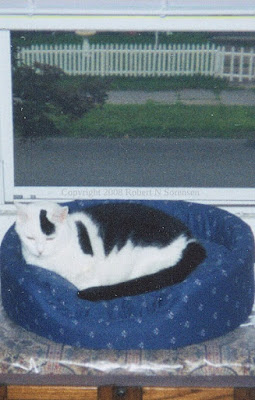The Created Cat Kind
 Ever notice that many of the animals we have are used for a purpose? Throughout history, we've used them for food and many have been domesticated for labor (plowing, riding, and so forth) and some as pets. (Cowboy wisdom: never name a cow you're going to eat.) Smaller animals like dogs are often useful, birds can be cute and fascinating, reptiles as well, and cats — don't try to harness a tiger, and the house cat is too small to be a laborer. Sometimes for catching mice, and yet, they are adored pets in many places around the world. Some of us coddle them while marveling at their grace and dignity. Guess we humans don't necessarily have to be utilitarian about everything, do we? Especially when many of us consider pets a part of the family.
Ever notice that many of the animals we have are used for a purpose? Throughout history, we've used them for food and many have been domesticated for labor (plowing, riding, and so forth) and some as pets. (Cowboy wisdom: never name a cow you're going to eat.) Smaller animals like dogs are often useful, birds can be cute and fascinating, reptiles as well, and cats — don't try to harness a tiger, and the house cat is too small to be a laborer. Sometimes for catching mice, and yet, they are adored pets in many places around the world. Some of us coddle them while marveling at their grace and dignity. Guess we humans don't necessarily have to be utilitarian about everything, do we? Especially when many of us consider pets a part of the family.So, where do they come from? The consensus was that our pets came from Egypt. Although they were worshiped there, genetic testing indicats — I mean, indicates — that they came from Shinar. Well, the Iraq area. And they ultimately descended from an ancestral pair that Noah took on the Ark. After the dispersion of people at Babel, they took their pets with them. See "Cats from Shinar, not Egypt".
Cats are problematic for proponents of fish-to-feline evolution. Yes, there have been mutations over the centuries (including selective breeding), and the presence of stripes is a problem for evolution. For that matter, they have a problem explaining the presence of manes as well. After an introduction, I link to a technical creationist article in "The Origin of the Cat Family".
Our little frisky friends appear throughout history and receive several mentions in the Bible. Everything was created vegetarian, and at the close of all things in the final revelation, there will be no more of the killing and eating of animals. If you are a vegan, that's your choice, but it's not your cat's choice because (except for a few exceptions) it must eat meat. Several animals do that. So don't be getting ahead of God's timetable force your food choices on an animal, you savvy? Cats can be affectionate and loyal, especially the blind one that attacked an intruder. I'm glad God provided us with pets, and I cotton to the ones that purr.
Cats are reckoned to be “the most popular pet in the world”, with more than 600 million living among people worldwide, despite the fact that they “contribute virtually nothing in the way of sustenance or work to human endeavour.” This helps explain why there is much less variation in domestic cats than in dogs. The diversity of canine sizes, shapes, and temperaments reflects the fact that people have long selected and bred dogs for such tasks as guarding, herding, hunting, and sled-pulling. Cats on the other hand, which according to Scientific American, “do not take instruction well”, have not been subjected to the same selective breeding pressures. While domestic dogs can look completely distinct from their ‘ancestral wolf’ form, many house cats are hard to distinguish from the wildcat—with which they readily interbreed, and share the same species name, Felis silvestris.To read the rest, click on "Cats big and small".